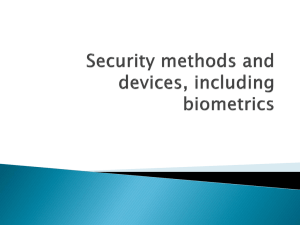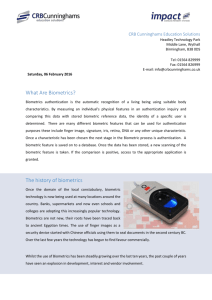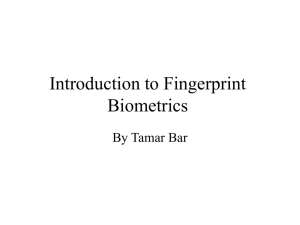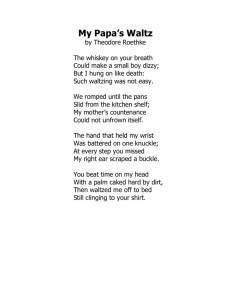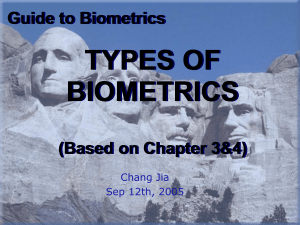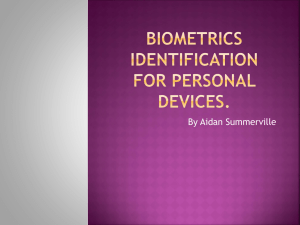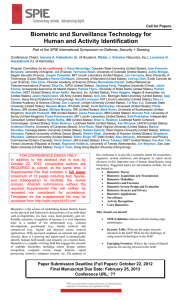www.ijecs.in International Journal Of Engineering And Computer Science ISSN:2319-7242
advertisement
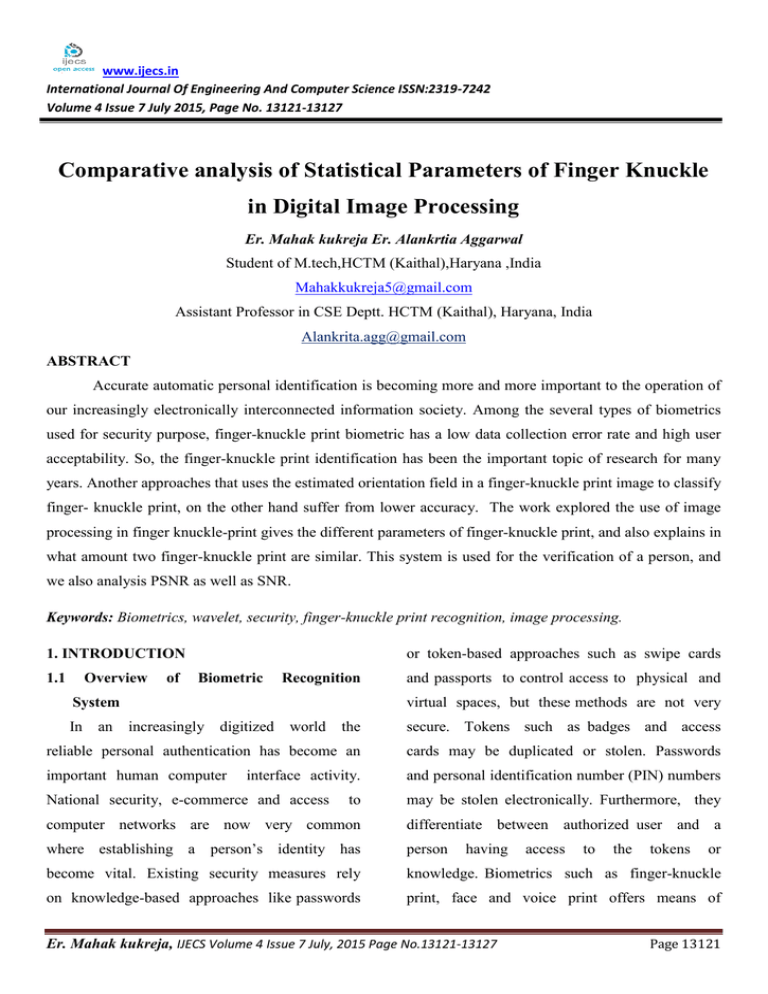
www.ijecs.in International Journal Of Engineering And Computer Science ISSN:2319-7242 Volume 4 Issue 7 July 2015, Page No. 13121-13127 Comparative analysis of Statistical Parameters of Finger Knuckle in Digital Image Processing Er. Mahak kukreja Er. Alankrtia Aggarwal Student of M.tech,HCTM (Kaithal),Haryana ,India Mahakkukreja5@gmail.com Assistant Professor in CSE Deptt. HCTM (Kaithal), Haryana, India Alankrita.agg@gmail.com ABSTRACT Accurate automatic personal identification is becoming more and more important to the operation of our increasingly electronically interconnected information society. Among the several types of biometrics used for security purpose, finger-knuckle print biometric has a low data collection error rate and high user acceptability. So, the finger-knuckle print identification has been the important topic of research for many years. Another approaches that uses the estimated orientation field in a finger-knuckle print image to classify finger- knuckle print, on the other hand suffer from lower accuracy. The work explored the use of image processing in finger knuckle-print gives the different parameters of finger-knuckle print, and also explains in what amount two finger-knuckle print are similar. This system is used for the verification of a person, and we also analysis PSNR as well as SNR. Keywords: Biometrics, wavelet, security, finger-knuckle print recognition, image processing. or token-based approaches such as swipe cards 1. INTRODUCTION 1.1 Overview of Biometric Recognition virtual spaces, but these methods are not very System In an and passports to control access to physical and increasingly digitized world the secure. Tokens such as badges and access reliable personal authentication has become an cards may be duplicated or stolen. Passwords important human computer and personal identification number (PIN) numbers interface activity. National security, e-commerce and access to may be stolen electronically. Furthermore, they computer networks are now very common differentiate between authorized user and a where establishing a person’s identity has person become vital. Existing security measures rely knowledge. Biometrics such as finger-knuckle on knowledge-based approaches like passwords print, face and voice print offers means of having Er. Mahak kukreja, IJECS Volume 4 Issue 7 July, 2015 Page No.13121-13127 access to the tokens or Page 13121 reliable personal authentication that can address the user and therefore cannot be circumvented these problems and is gaining citizen and through a dictionary or brute force style government acceptance. attack. Biometrics has also been shown to possess a higher bit strength compared to 1.1.1Biometrics password Biometrics is the science of verifying the identity physiological of an individual measurements traits [1]. or based systems and is therefore inherently secure. through c) Screening behavioural Since biometric identifiers are In screening applications, we are interested associated permanently with the user. They are in preventing the users from assuming multiple more reliable than token or knowledge based identities e.g. a terrorist using multiple passports authentication methods. It can be used to achieve to enter a foreign country. This requires that we a “positive identification” with a very high level ensure a person has not already enrolled under of confidence, such as an error rate of 0.001% another assumed identity before adding his new Biometrics record into the database. Such screening is not offers several advantages over traditional security measures. These includes possible token traditional authentication mechanisms and biometrics provides the only a) Non-repudiation With using available solution. and password based approaches, the perpetrator can always deny committing the crime pleading that his/her The various biometric modalities can be broadly categorized as password or ID was stolen or compromised Physical biometrics: These involve some even when confronted with an electronic audit form of physical measurement and include trail. There is no way in which his claim can be modalities such as face, fingerprints, iris-scans, verified effectively. This hand, finger-knuckle print geometry etc. is known as the problem of deniability or of ’repudiation’. However, biometrics is indefinitely associated with a user and hence it cannot be lent or stolen making such repudiation infeasible. b) Accuracy and Security Password based systems are prone to Behavioural biometrics: These are usually temporal in nature and involve measuring the way in which a user performs certain tasks. This includes modalities such as speech, signature, gait, keystroke dynamics etc 2. FINGER-KNUCKLE PRINTS AS A dictionary and brute force attacks. Furthermore, BIOMETRIC: such systems are as vulnerable as their weakest Finger knuckle-print biometric system has widely password. On the other hand, biometric used in modern e-world. The region of interest is authentication requires the physical presence of needed as the key for the feature extraction in a Er. Mahak kukreja, IJECS Volume 4 Issue 7 July, 2015 Page No.13121-13127 Page 13122 good biometric system. The symmetric discrete processing orthonormal stock well transform provides the Squared Error is used for this task, due to its computational simplicity and its many nice mathematical information efficiency of and wavelet multi-scale transforms, while providing texture features in terms of Fourier algorithms. Traditionally, Mean properties. For Quality Analysis of finger-knuckle Images, step by step operations performed are:[2] frequencies. It outperforms leading wavelet-based texture analysis methods. This motivates us to propose a new local and global feature extractor. For the finger knuckle-print, the local and global Start features are critical for an image observation and recognition. For the finger knuckle-print, the local and global information are critical for an image Load Original and Distorted finger – knuckle print images observation and recognition. The finger-back surface, also known as dorsum of hand, can be highly useful in user identification and has not yet attracted the attention of Evaluate PSNR, SNR of finger-knuckle print researchers. The contact free imaging of the finger back surface is highly convenient to users. The skin pattern on the finger-knuckle is highly rich in Evaluate the Quality Value of MSSIM of finger –knuckle print texture due to skin folds and creases, and hence, can be considered as a biometric identifier. Further, advantages of using Finger Knuckle Print Plot graph for each image and its histogram (FKP) include rich in texture features, easily accessible, contact-less image acquisition, Stop invariant to emotions and other behavioural aspects such as tiredness, stable features and Fig. 1.1: Flowchart of the Methodology Adopted acceptability in the society [1]. 2.1 METHODOLOGY USED FOR FINGER KNUCKLE Finger-knuckle print matching system consists in modelling the perceptual quality metric between an original (ideal) finger-knuckle print and a distorted version of it. The goal is to evaluate and compare the performance of digital image Er. Mahak kukreja, IJECS Volume 4 Issue 7 July, 2015 Page No.13121-13127 Page 13123 print images and features are also extracted of two finger-knuckle print. 2.2 Load the Original and Distorted Fingerknuckle print Images Firstly we load the original and distorted Fingerknuckle print images to analyse the quality of distorted images by taking original images as reference. This method is known as full reference modals. The Finger-knuckle print images used are as follows:[3] 2.5 Simulation Results for edge detection: In this we load the two finger- knuckle print and edges of the two finger- knuckle print are to be detected. Canny and sobal operator is to be used for their edge detection. Fig. 1.2:Finger-knuckle print images used for analysis a) Front Side, b)Left Side 2.3 Experimental Results and Discussion In this section, we compare the performance of MSSIM with the statistical methods that are PSNR, SNR. The specific contents of the type of noise we have used are salt & pepper noise. 2.6 Simulation Results for MSSIM: In this we load the two finger- knuckle print and calculate the mean structural similarity index and peak signal to noise ratio and also calculate the signal to noise ratio of the finger knuckle print. Mean 2.4 Simulation Results for Histogram: In this structural similarity index defines the amount of we load the two finger- knuckle print and draw its similarity between the two finger-knuckle print. corresponding PSNR and SNR define the distortion of finger- histogram, which gives the graphical representation of the finger- knuckle Er. Mahak kukreja, IJECS Volume 4 Issue 7 July, 2015 Page No.13121-13127 Page 13124 knuckle print. The amount of similarity and PSNR 1 Mean and SNR is to be calculated.[4] [5] 0.839392 structural similarity index 2 Elapsed Time 0.271893 Seconds 3 Peak signal to 18.682665 noise ratio 4 Signal to noise 11.6355 ratio 3. CONCLUSION The work explored the use of wavelet transform to reduce the size of fingerprint images with less pre-processing and post-processing 2.7 Load the Original and Distorted Finger- operations which made the system simple and less knuckle print Images space and time consuming. It has also explored the use of new feature vector wavelet cooccurrence signatures to match the database fingerprint images with the input fingerprint images using Euclidian distance. [6][7] After this proposed work, it can be concluded that it is more efficient, than previous techniques of fingerprint recognition due to the following reasons – fig.1.3:Finger-knuckle print images used for and of diagonal fingerprint Table 1.1Calculation of different parameter of wavelets directional direction image of the increases the recognition rate. finger –knuckle print Parameter use resolving power in horizontal, vertical analysis a) Front Side, b)Left Side Sr No. The Values The use of multi resolution, compactness and den-noising property Er. Mahak kukreja, IJECS Volume 4 Issue 7 July, 2015 Page No.13121-13127 Page 13125 of wavelets makes it useful in fingerprint recognition system. [1] A.K. Jain, R. Bolle and S. Pankanti, Biometrics, “Personal Networked Wavelet transform reduced the size of Identification in a Society”, Kluwer Academic Publishers, 1999. fingerprint. [2] Shubhangi Neware, Dr. Kamal Mehta, Dr. The system cropped out only the core location (small portion of image) of the fingerprint image to make it translation invariant. Besides being the efficient algorithm, it has not degraded the accuracy which is still 95%. A.S. Zadgaonkar,” Finger Knuckle Surface Biometrics” International Journal of Emerging Technology and Advanced Engineering Website: www.ijetae.com (ISSN 2250-2459, ISO 9001:2008 Certified Journal, Volume 2, Issue 12, December 2012) So, the fingerprint identification system developed during the work has proved to be a cost effective algorithm in both time and space, with a good [3] Lin Zhang, Lei Zhang, and David Zhang,” level of accuracy. And the work explored the use Finger-Knuckle-Print Verification Based on Band- of image processing in finger knuckle-print gives Limited the give the different parameter of finger-knuckle Research Center, Department of Computing, The print, and also explain in what amount two finger- Hong Kong Polytechnic Univeristy.2012 knuckle print are similar. This system is used for [4] Mounir Amraoui, Mohamed Ei Aroussi, the verification of a person, and we also analysis Rachid Saddaan, Mohhmmed Wahbi,” FINGER- PSNR as well as SNR. KNUCKLE-PRINT RECOGNITION BASED ON Phase-Only Correlation” Biometrics LOCAL AND GLOBAL FEATURE SETS” 4. FUTURE WORK Journal of Theoretical and Applied Information The work would be improved in the future; by the Technology 15th December 2012. Vol. 46 No.1 © use of other directional resolving algorithm of 2005 - 2012 JATIT & LLS. All rights reserved. images. The system could have better accuracy when the database images are trained using neural [5] Dr. Vinayak Ashok Bharadi,” Texture Feature network, which has not been implemented here. Extraction For Biometric Authentication using The developed system has the satisfactory Partitioned performance for the small test sample. The Domain” IJACSA Special Issue on Selected performance degrades when the sample size is Papers increased, this can be addressed in future. Workshop On Emerging Trends In Technology Complex from Planes International in Transform Conference & 2012. REFERENCES [6] E. Montiel, A. S. Aguado, M. S. Nixon, “Texture classification Er. Mahak kukreja, IJECS Volume 4 Issue 7 July, 2015 Page No.13121-13127 via conditional Page 13126 histograms”, Pattern Recognition Letters, 26, pp. 1740-1751(2005). [7] Hongsong Li, Da Li, “A New Image Coding Scheme Based Upon Image Pattern Recognition,” International Conference on Information Systems (ICIS), USA, pp.12-15, 2010. Er. Mahak kukreja, IJECS Volume 4 Issue 7 July, 2015 Page No.13121-13127 Page 13127
